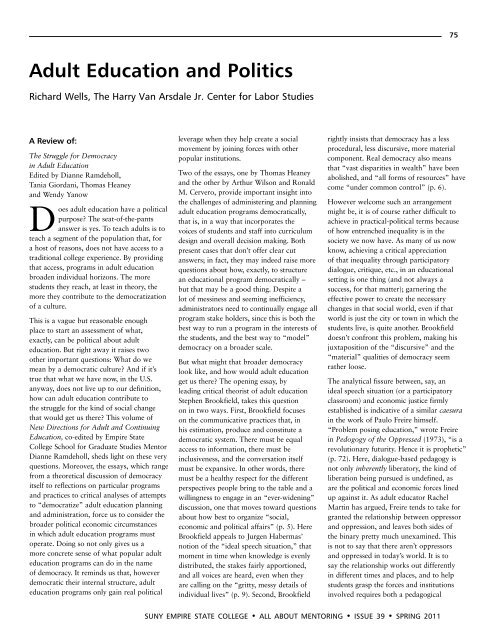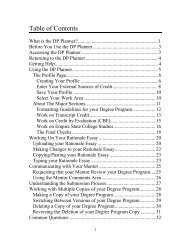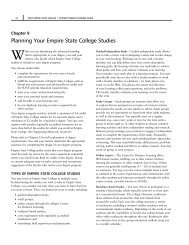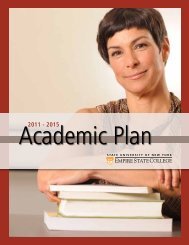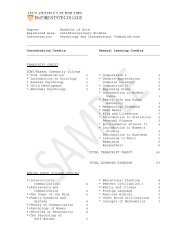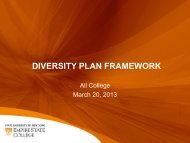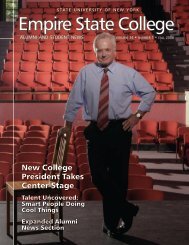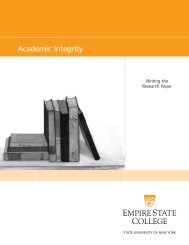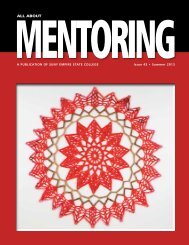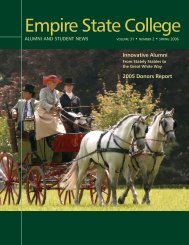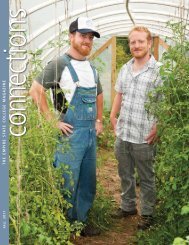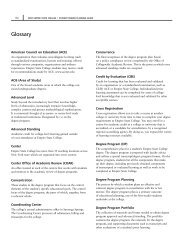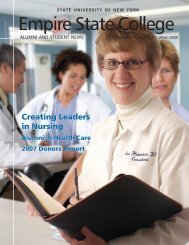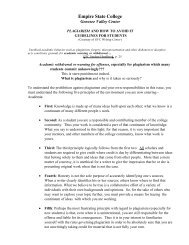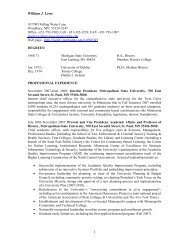All About Mentoring Spring 2011 - SUNY Empire State College
All About Mentoring Spring 2011 - SUNY Empire State College
All About Mentoring Spring 2011 - SUNY Empire State College
You also want an ePaper? Increase the reach of your titles
YUMPU automatically turns print PDFs into web optimized ePapers that Google loves.
75<br />
Adult Education and Politics<br />
Richard Wells, The Harry Van Arsdale Jr. Center for Labor Studies<br />
A Review of:<br />
The Struggle for Democracy<br />
in Adult Education<br />
Edited by Dianne Ramdeholl,<br />
Tania Giordani, Thomas Heaney<br />
and Wendy Yanow<br />
Does adult education have a political<br />
purpose The seat-of-the-pants<br />
answer is yes. To teach adults is to<br />
teach a segment of the population that, for<br />
a host of reasons, does not have access to a<br />
traditional college experience. By providing<br />
that access, programs in adult education<br />
broaden individual horizons. The more<br />
students they reach, at least in theory, the<br />
more they contribute to the democratization<br />
of a culture.<br />
This is a vague but reasonable enough<br />
place to start an assessment of what,<br />
exactly, can be political about adult<br />
education. But right away it raises two<br />
other important questions: What do we<br />
mean by a democratic culture And if it’s<br />
true that what we have now, in the U.S.<br />
anyway, does not live up to our definition,<br />
how can adult education contribute to<br />
the struggle for the kind of social change<br />
that would get us there This volume of<br />
New Directions for Adult and Continuing<br />
Education, co-edited by <strong>Empire</strong> <strong>State</strong><br />
<strong>College</strong> School for Graduate Studies Mentor<br />
Dianne Ramdeholl, sheds light on these very<br />
questions. Moreover, the essays, which range<br />
from a theoretical discussion of democracy<br />
itself to reflections on particular programs<br />
and practices to critical analyses of attempts<br />
to “democratize” adult education planning<br />
and administration, force us to consider the<br />
broader political economic circumstances<br />
in which adult education programs must<br />
operate. Doing so not only gives us a<br />
more concrete sense of what popular adult<br />
education programs can do in the name<br />
of democracy. It reminds us that, however<br />
democratic their internal structure, adult<br />
education programs only gain real political<br />
leverage when they help create a social<br />
movement by joining forces with other<br />
popular institutions.<br />
Two of the essays, one by Thomas Heaney<br />
and the other by Arthur Wilson and Ronald<br />
M. Cervero, provide important insight into<br />
the challenges of administering and planning<br />
adult education programs democratically,<br />
that is, in a way that incorporates the<br />
voices of students and staff into curriculum<br />
design and overall decision making. Both<br />
present cases that don’t offer clear cut<br />
answers; in fact, they may indeed raise more<br />
questions about how, exactly, to structure<br />
an educational program democratically –<br />
but that may be a good thing. Despite a<br />
lot of messiness and seeming inefficiency,<br />
administrators need to continually engage all<br />
program stake holders, since this is both the<br />
best way to run a program in the interests of<br />
the students, and the best way to “model”<br />
democracy on a broader scale.<br />
But what might that broader democracy<br />
look like, and how would adult education<br />
get us there The opening essay, by<br />
leading critical theorist of adult education<br />
Stephen Brookfield, takes this question<br />
on in two ways. First, Brookfield focuses<br />
on the communicative practices that, in<br />
his estimation, produce and constitute a<br />
democratic system. There must be equal<br />
access to information, there must be<br />
inclusiveness, and the conversation itself<br />
must be expansive. In other words, there<br />
must be a healthy respect for the different<br />
perspectives people bring to the table and a<br />
willingness to engage in an “ever-widening”<br />
discussion, one that moves toward questions<br />
about how best to organize “social,<br />
economic and political affairs” (p. 5). Here<br />
Brookfield appeals to Jurgen Habermas’<br />
notion of the “ideal speech situation,” that<br />
moment in time when knowledge is evenly<br />
distributed, the stakes fairly apportioned,<br />
and all voices are heard, even when they<br />
are calling on the “gritty, messy details of<br />
individual lives” (p. 9). Second, Brookfield<br />
rightly insists that democracy has a less<br />
procedural, less discursive, more material<br />
component. Real democracy also means<br />
that “vast disparities in wealth” have been<br />
abolished, and “all forms of resources” have<br />
come “under common control” (p. 6).<br />
However welcome such an arrangement<br />
might be, it is of course rather difficult to<br />
achieve in practical-political terms because<br />
of how entrenched inequality is in the<br />
society we now have. As many of us now<br />
know, achieving a critical appreciation<br />
of that inequality through participatory<br />
dialogue, critique, etc., in an educational<br />
setting is one thing (and not always a<br />
success, for that matter); garnering the<br />
effective power to create the necessary<br />
changes in that social world, even if that<br />
world is just the city or town in which the<br />
students live, is quite another. Brookfield<br />
doesn’t confront this problem, making his<br />
juxtaposition of the “discursive” and the<br />
“material” qualities of democracy seem<br />
rather loose.<br />
The analytical fissure between, say, an<br />
ideal speech situation (or a participatory<br />
classroom) and economic justice firmly<br />
established is indicative of a similar caesura<br />
in the work of Paulo Freire himself.<br />
“Problem posing education,” wrote Freire<br />
in Pedogogy of the Oppressed (1973), “is a<br />
revolutionary futurity. Hence it is prophetic”<br />
(p. 72). Here, dialogue-based pedagogy is<br />
not only inherently liberatory, the kind of<br />
liberation being pursued is undefined, as<br />
are the political and economic forces lined<br />
up against it. As adult educator Rachel<br />
Martin has argued, Freire tends to take for<br />
granted the relationship between oppressor<br />
and oppression, and leaves both sides of<br />
the binary pretty much unexamined. This<br />
is not to say that there aren’t oppressors<br />
and oppressed in today’s world. It is to<br />
say the relationship works out differently<br />
in different times and places, and to help<br />
students grasp the forces and institutions<br />
involved requires both a pedagogical<br />
suny empire state college • all about mentoring • issue 39 • spring <strong>2011</strong>


